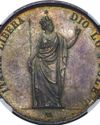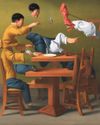CATEGORIES
Kategoriler
Son Hikayeler

The Italian Job
ITA Airways will officially become a new member of the Lufthansa Group—but what does that mean for passengers?

The Green Shift
Exploring sustainability trends in travel

Green Gems
An international list of stylish spots

FOOD FOR THOUGHT
BEANLESS COFFEE, COCOA-FREE CHOCOLATE AND PROTEIN MADE FROM THIN AIR– THE FUTURE OF FOOD IS FASCINATING, WITH REGENERATIVE FARMING AND FERMENTATION HELPING TO TACKLE CLIMATE CHANGE AND POPULATION GROWTH

A Room With a View
This ultraluxe escape delivers privacy, fine amenities and personalized check-in before a flight

German Engineering
Lufthansa sets a high bar with its new—and long awaited—Allegris cabin

A New Day for Boeing?
Although the aircraft producer continues to lag behind Airbus, it may be seeing a brighter future

More Is More
Delta continues to ramp up its lounge experience

HOW TO MAKE THE URBAN CORE GREENER
Innovative cities are prioritizing nature to promote a healthier environment

That '70s Show
A high-end lounge combines a retro vibe and swank cocktails on the shores of South Beach

Tough Love
Toyota brings back a rugged classic

Mesa: A Hub for Innovation and Technology
Mesa, Arizona, has emerged as a destination for cutting-edge technology companies, making it ideal for businesses seeking an innovative environment.

SS&TP: A Gathering of Experts
New Mexico is home to the Sandia Science & Technology Park and major tech companies like Facebook, Intel, and Lockheed Martin, making the state a key part of the science and tech industry

National Geographic Incredible Animal Journeys
Cinematographer Talks Tech and Wildlife Conservation

Mullvad VPN: The ultimate privacy-first VPN
What it lacks in flashy features, it makes up for in unrivaled privacy.

Politicians Debate Tariffs & Taxes
WILL TARIFF-SLAPPED CHINA STOP BUYING GOLD?

2025 New World Order
SUPREMELY IMPORTANT INTERNATIONAL COIN EXPO

Innovation in the Metaverse
The Emergence of Avatars in the Digital Realm

The Rise of Smart Home Furniture
Merging Comfort With Technology Like Never Before

AR and VR in Telehealth
Will It Disrupt the Healthcare Industry?

AI and Design
Is The Art World Embracing Al?

The Next Generation of Smart Homes
A Glimpse into the Future of Residential Tech

Robots and Space Exploration
From Mars Rovers to Beyond

The Rise and Fall of Tesla's Cottage Industry
Why Can't Experts Agree on Market Forecasts for EVs?

HGTV's 2024 Smart Home
Insights From Interior Designer and TV Personality Tiffany Brooks

Acting and AI
Hollywood Legend William H. Macy on the Challenges of Quickly-Changing Technology

These Robots Are Out of Control
Proving to a Robot That I'm Not a Robot

I saw Alexa+ in action. Here are my 8 biggest takeaways
The new AI-supercharged Alexa is finally coming to an Echo display near you. Here's what looks most promising—and problematic.

Graphics card pricing is a lie
Both Nvidia and AMD are announcing prices for new GPUs that customers have essentially zero chance of actually paying.

Charting New Territories
The Beginning of Robotization with Cobots
